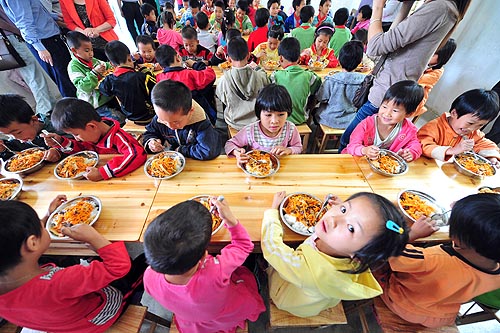|
 |
|
NUTRITIOUS LUNCH: Primary school students in Shanglin County, Guangxi Zhuang Autonomous Region, enjoy their free lunch provided by the government (XINHUA) |
Water Price
Recently, at a water price hearing held in Kalpin County in Aksu Prefecture in Xinjiang Uygur Autonomous Region, a proposal of increasing water prices was rejected by local residents who attended the hearing. The concerned departments said the water price issue would be further discussed until local people were satisfied.
The county seems to be the first place in China trying to deny a water price increase proposal. Surprisingly, it's not a big city, but a small border county in the west region.
This case serves as a good example for the rest of China, especially big cities that are always regarded as more advanced in organization and more democratic in dealing with public affairs. But, in respect of water price hearings, in most cases, the hearing result is totally opposite from what the residents want. It seems big cities are being left behind and they have something to learn from some small places and try to do better in respecting citizens' rights and interests.
The Beijing News
Free Lunch
In March, more than 500 media personnel in China launched a "free lunch" program, calling on the society to donate to poor children who could not afford a lunch every day. By now, the donations from the society have exceeded 1.76 million yuan ($270,000) and have been contributed to children in underdeveloped provinces such as Guizhou, Henan and Hunan.
A simple and nutritious lunch in mountain areas costs only 3 yuan ($0.46), which amounts to 600 yuan ($92.3) a year. This small sum can prevent children from fainting on the way to school because of malnutrition.
The free-lunch program initiated by media personnel has operated for a period. With a set of standard procedures now in place, the program has won trust from the whole of society. Nevertheless, unofficial charity campaigns can only benefit a small number of students, the government should also play a role in these charity programs.
The China Development Research Foundation issued a report in February, saying nourishment for children in impoverished mountain areas has improved, but the problems of malnutrition remain serious. The physical examination reports of the students in these areas show 72 percent of them feel hungry during class. It's a shame the world's second largest economy had so many hungry children.
China now has about 150 million primary and middle school students. The government only needs to pay 90 billion yuan ($13.8 billion) on all these students' lunches and this is absolutely financially acceptable to the Chinese Government. If the government wants to move on step by step by first taking care of the most needy, expenses will be much lower.
Children are our nation's future. Providing free nutritious lunches to children is the basis of good education, and this should be written into law.
Yangtze Evening Post
Food Safety
A survey recently conducted by the Shanghai Customer Evaluation Center on Shanghai's food industry shows 559 of the 824 surveyed food factories gave low evaluation of themselves.
It's a surprise almost 70 percent of the surveyed enterprises think lowly of themselves. Meanwhile, the survey reveals that 46.9 percent of the enterprises said they thought they were not mainly responsible for food safety problems. They try to explain away their irresponsibility by giving reasons such as high production costs and slack supervision.
When businesses lacking self-discipline, strict supervision systems should be in place. Only by sharply increasing the cost of law violations to enterprises can we expect these enterprises to learn to abide by the law.
Recently, in face of a series of food safety scandals, related supervision departments have taken actions to improve food safety in China. We hope the regular supervision will be stricter and more transparent.
Xinmin Evening News
Shopping Sprees
Global Blue, a world leader in tax refund services, says Chinese tourists are the top consumers of France, as they spent $933 million on duty-free goods in 2010 when they traveled in France.
It is understandable that Chinese consumers top others. With rapid economic growth, the Chinese now have more opportunities to travel abroad. As Chinese cherish family and friends, they would always bring many gifts or souvenirs home when they come back from abroad.
But the major reason for Chinese' shopping abroad is the huge price gap between the domestic and overseas markets for the same commodity. China's Ministry of Commerce says the prices of 20 brands of five types of commodities, such as watches, suitcases, clothes, wine and electronic products, in China are 51 percent higher than those in the United States, and 72 percent higher than those in France. Given such big price difference, it's natural for traveling Chinese to go on shopping sprees abroad.
In recent years, domestic manufacturers have emphasized profit too much, at the sacrifice of product quality. Also, imported goods sometimes sell for extremely expensive prices in China and they might be fake. But in overseas market, Chinese feel secure about quality. So why can't they do the shopping?
Some may think shopping abroad is a kind of blind belief in foreign commodities, but isn't it also a warning to domestic manufacturers? It's time to develop China's own brands and quality products to win back consumers' trust.
Yanzhao Evening News | 